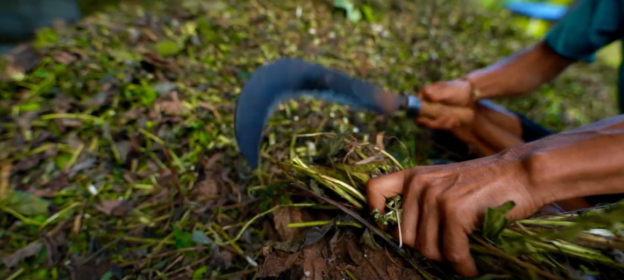IKI Small Grants presents a series of new videos from ongoing projects in Nepal streaming on our YouTube channel and on the project’s pages. The videos illustrate the innovative and sustainable methods the small organisations use to tackle the challenges of deforestation, sustainable cooking and invasive species.
From firewood to electric cooking
“Promoting electric cooking in Nepalese households” features the project implemented by People, Energy and Environment Development Association (PEEDA), in Nepal’s Baiteswor rural municipality. An estimated 70 per cent of Nepalese households cook with firewood. However, use of traditional wood-fuelled cookstoves is one of the main causes of indoor air pollution and greenhouse gas emissions in Nepal. As women are the primary users of cookstoves, traditional means of cooking severely impact women’s health and well-being. Not only does the traditional approach pose a risk to health. Extracting firewood puts pressure on forests due to deforestation and loss of soil fertility. The project promotes using electric stoves to provide cleaner, healthier, and cooking with less pollution to 500 households in the municipality. At the same time, cooking with electricity is less time-consuming, helping to empower women and promote equality in Baiteswor’s communities.
Cooking with biogas in Tulsipur
“Clean energy initiatives in Dang District, Nepal” also promotes clean energy for households in rural areas in Tulsipur Sub-Metropolitan City. Besides firewood, the Nepal’s rural population uses cow dung cakes for cooking and heating. Wildlife Conservation Nepal (WCN) is working on installing up to 200 biogas plants, a sustainable source of cooking and heating. Thanks to the installations, emissions are already decreasing and the ease on forests burden has opened the path for reforestation. Up to 5,000 households benefited from trees planted on 100 hectares of community forest. A further 200 households benefit from reduced soil nutrient depletion, relevant as drought is one of the major threats in the region. To promote further awareness on climate change and mitigation strategies, a new radio programme started in coordination with Tulsipur Sub-Metropolitan City, broadcasting educational content on climate action for the local population.
Transforming thorns into manure for livelihoods
Forest conservation is at the heart of the project “Managing invasive species in community forests in Nepal” in Chitwan National Park. The local NGO Forest Resources Studies & Action Team is working on the challenge of managing Invasive Alien Plant Species (IAPS), a growing burden in many of Nepal’s community forests. Species such as Mikania micrantha, Chromolaena odorata and Lantana camera compromise biodiversity and ecosystems and people’s access to forest resources. Chitwan National Park represents 13% of Nepal’s forest area, and Forest Resources Studies and Action Team works together with local community forest user groups (CFUGs) to turn IAPS into manure for agriculture. So far, Forest Resources Studies and Action Team and other IKI Small Grants projects in Nepal have together restored 5,000 hectares of community forest, an area that equals approximately the size of the country’s capital, Kathmandu. Through methods and tools in line with local people’s traditions and ecosystem, the project also works to reduce the use of chemicals.

